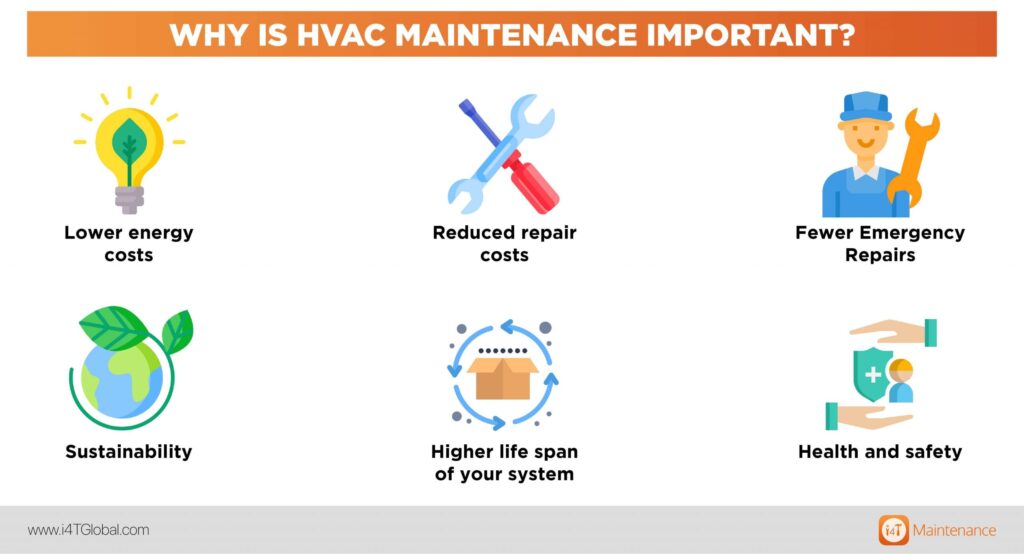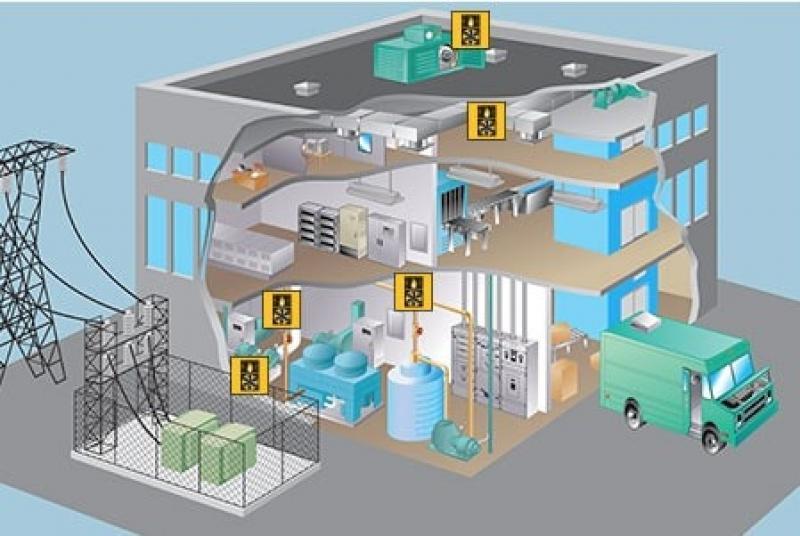
Welcome to our blog, where we’re diving into the world of HVAC systems and unlocking the secrets to getting more efficiency out of them. If you’ve ever found yourself sweating through a hot summer day or shivering through a cold winter night despite your HVAC system working overtime, this article is for you. We’ll explore five practical ways to maximize the efficiency of your HVAC system, helping you save energy and money while enjoying optimal comfort in your home. So let’s roll up our sleeves and get ready to make your HVAC system work smarter, not harder!
Understanding The Importance Of HVAC Efficiency

When it comes to our HVAC systems, efficiency is key. But what exactly does that mean? Simply put, HVAC efficiency refers to how effectively your system operates in providing heating and cooling while using the least amount of energy possible. It’s all about finding that perfect balance between comfort and conservation.
Why is this important? Well, for starters, an efficient HVAC system can significantly reduce your energy bills. By minimizing wasted energy, you’ll be saving both money and resources in the long run. Plus, with rising concerns about environmental impact and sustainability, improving HVAC efficiency is a responsible choice that benefits not only your pocket but also the planet.
Another crucial aspect of HVAC efficiency is its impact on indoor air quality. A well-maintained and properly functioning system ensures better ventilation and filtration, reducing allergens, pollutants, and contaminants in your home. This means cleaner breathing air for you and your loved ones.
Furthermore, an efficient HVAC system extends its lifespan by reducing wear and tear on components like motors or compressors. Regular maintenance coupled with increased efficiency can help avoid costly repairs or premature replacements down the line.
So whether you’re motivated by financial savings or environmental stewardship (or both), understanding the importance of HVAC efficiency sets the stage for implementing strategies that will optimize performance while keeping costs low.
Regular Maintenance And Upkeep

Regular maintenance and upkeep are essential for ensuring the efficiency of your HVAC system. By taking proactive measures to maintain your system, you can not only extend its lifespan but also improve its overall performance.
One important aspect of regular maintenance is cleaning or replacing air filters. Clogged filters restrict airflow, forcing your HVAC system to work harder and consume more energy. By regularly cleaning or replacing these filters, you can ensure optimal airflow and reduce strain on the system.
Another crucial step in maintaining your HVAC system is inspecting and cleaning the outdoor unit. Over time, debris such as leaves, dirt, or grass clippings can accumulate around the unit, obstructing airflow. Regularly clearing away this debris will help prevent unnecessary strain on the system.
Additionally, it’s important to schedule annual professional inspections of your HVAC system. A trained technician can identify any potential issues early on and address them before they become major problems. They will also clean and lubricate components as needed to keep everything running smoothly.
In between professional inspections, it’s a good idea to perform some basic DIY maintenance tasks yourself. This includes regularly checking for leaks in ductwork and sealing them promptly to prevent air loss. You should also make sure that vents are clear from obstructions so that conditioned air can flow freely throughout your home.
By making regular maintenance and upkeep a priority for your HVAC system, you’ll not only save money on energy bills but also enjoy improved comfort year-round! So don’t neglect this crucial aspect of HVAC efficiency – take care of your system today!
Choosing The Right Size And Type of HVAC System For Your Home

Choosing the right size and type of HVAC system for your home is crucial when it comes to maximizing efficiency. One common mistake homeowners make is purchasing an HVAC system that is either too large or too small for their space.
If you choose a system that is too large, it will constantly cycle on and off, wasting energy and causing unnecessary wear and tear on the equipment. On the other hand, if you choose a system that is too small, it may struggle to adequately heat or cool your home, resulting in inefficiency and discomfort.
To determine the right size of HVAC system for your home, it’s important to consider factors such as square footage, insulation levels, number of windows, and local climate conditions. A professional HVAC technician can conduct a load calculation to accurately assess your specific needs.
In addition to size considerations, selecting the right type of HVAC system for your home can also impact efficiency. There are various options available including central air conditioning systems, heat pumps, ductless mini-split systems, and geothermal systems. Each has its own advantages and suitability based on factors like budgetary constraints and regional climate patterns.
When choosing an HVAC system for optimal efficiency in your home, it’s essential to consult a qualified professional who can guide you through the selection process based on thorough assessments; this ensures that you invest in equipment perfectly suited to meet both comfort requirements as well as energy-saving goals.
Investing In Energy-Efficient Equipment And Technology

One of the most effective ways to improve the efficiency of your HVAC system is by investing in energy-efficient equipment and technology. By upgrading to newer models that have higher SEER (Seasonal Energy Efficiency Ratio) ratings, you can significantly reduce your energy consumption and lower your utility bills.
Energy-efficient HVAC systems are designed to use less electricity while providing optimal heating or cooling for your home. These systems often incorporate advanced technologies such as variable-speed motors, which adjust their speed based on the temperature needs of your space. This ensures that they operate at peak efficiency without wasting unnecessary energy.
In addition to upgrading your HVAC unit, consider investing in smart thermostats and zoning systems. Smart thermostats allow you to control the temperature settings remotely through a mobile app or voice commands, maximizing comfort while minimizing energy usage. Zoning systems divide your home into different zones with separate thermostats, allowing you to heat or cool specific areas rather than wasting energy on unoccupied spaces.
By investing in these energy-efficient equipment and technologies, you not only reduce environmental impact but also save money in the long run. It’s a win-win situation for both homeowners and the planet! So why wait? Upgrade your HVAC system today and start enjoying improved efficiency and cost savings right away!
Implementing Smart Thermostats And Zoning Systems
One of the most effective ways to improve the efficiency of your HVAC system is by implementing smart thermostats and zoning systems. These innovative technologies allow you to have better control over the temperature in different areas of your home, resulting in optimized energy usage.
Smart thermostats are programmable devices that can be easily controlled through a smartphone app or voice commands. They offer features like adaptive learning, which allows them to learn your schedule and preferences over time and adjust the temperature accordingly. With a smart thermostat, you can set specific temperatures for different times of the day, ensuring that your HVAC system is not working unnecessarily when no one is at home.
Zoning systems take it a step further by dividing your home into separate zones with their own thermostats. This means that you can heat or cool only the areas that are being used, rather than wasting energy on empty rooms. By customizing each zone’s settings based on its occupancy and requirements, you can optimize comfort while minimizing energy consumption.
By implementing smart thermostats and zoning systems in your home, you can significantly increase the efficiency of your HVAC system. Not only will this result in lower utility bills but also reduce wear-and-tear on your equipment, increasing its lifespan. So why wait? Upgrade to these advanced technologies today and start enjoying improved comfort while saving money!
Simple Tips For Improving HVAC Efficiency At Home
1. Keep Your Filters Clean: One of the simplest yet most effective ways to improve HVAC efficiency is by regularly cleaning or replacing your air filters. Dirty filters can restrict airflow, causing your system to work harder and consume more energy. Make it a habit to check and clean your filters every month.
2. Seal Air Leaks: Gaps and cracks around windows, doors, and ducts can allow conditioned air to escape, leading to energy waste. By properly sealing these leaks with weather stripping or caulk, you can prevent drafts and ensure that your HVAC system operates efficiently.
3. Use Ceiling Fans Wisely: Utilizing ceiling fans in conjunction with your HVAC system can help distribute cool or warm air more evenly throughout your home. This allows you to set the thermostat at a slightly higher temperature during summer months or lower during winter months without sacrificing comfort.
4. Optimize Thermostat Settings: Programmable thermostats are a great tool for maximizing HVAC efficiency. Set them to adjust temperatures according to when you’re typically away from home or asleep, so you’re not wasting energy cooling or heating an empty house.
5. Schedule Regular Maintenance: Don’t underestimate the importance of professional maintenance for your HVAC system. It ensures that all components are working optimally, reduces wear and tear on parts, improves efficiency levels, and extends the lifespan of the equipment.
By following these simple tips, you can make significant strides in improving the efficiency of your HVAC system while also reducing energy consumption and lowering utility bills!
Conclusion
Efficiency is key when it comes to your HVAC system. Not only does it help you save on energy costs, but it also contributes to a more comfortable and sustainable home environment. By implementing the five strategies mentioned in this article, you can maximize the efficiency of your HVAC system and enjoy all the benefits that come with it.
Regular maintenance and upkeep are essential for keeping your HVAC system running smoothly. Don’t neglect routine inspections, filter changes, and cleaning tasks as they can greatly impact its performance. Additionally, choosing the right size and type of system for your home ensures optimal operation while minimizing energy waste.
Investing in energy-efficient equipment and technology is another effective way to boost HVAC efficiency. Look for units with high SEER ratings or Energy Star certifications to ensure maximum savings over time. And don’t forget about smart thermostats and zoning systems that provide precise control over temperature settings in different areas of your home.
Implementing simple tips like sealing air leaks, improving insulation, and adjusting thermostat settings can make a noticeable difference in overall efficiency. These small adjustments may seem insignificant at first glance but can add up to significant savings in the long run.
Remember that getting more efficiency out of your HVAC system doesn’t have to be complicated or costly. With proper maintenance, thoughtful choices regarding equipment selection, utilization of modern technologies like smart thermostats, plus a few easy-to-implement tips around the house – you’ll be well on your way to enjoying a more efficient heating and cooling experience!
So take action today! Start by scheduling regular maintenance appointments with trusted professionals who will keep your HVAC system performing at its best year-round. And don’t hesitate to explore new technologies that can further optimize comfort while reducing energy consumption.
By prioritizing efficiency in every aspect of your HVAC system’s care, you’ll not only save money but also contribute towards creating a greener future for generations to come.

